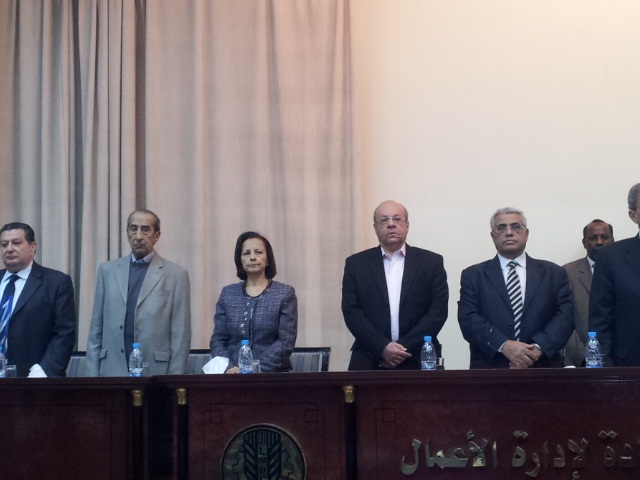The House of Representatives concluded its first legislative term in a closing session on Tuesday. Parliamentary speaker Ali Abdul Aal praised parliamentary members’ work and what he referred to as “cooperation with the government”.
According to the speech he made during the session, the parliament has examined 82 laws in total, two of which were proposed by MPs, and the rest by the cabinet.
The session was expected to witness the finalisation of the controversial Civil Service Law, but parliament eventually decided to postpone it to the upcoming legislative year, according to MP Haitham El-Hariri at the time of printing.
The Civil Services Law, now pending, was not the only one that had sparked public debate. The Value-Added Tax Law and the Church Construction Law had also stirred controversy, as opposed to laws that have not been issued despite constitutional obligation, such as the transitional justice law, or ones of more pressing urgency, such as the unified media law and the local municipality election law.
As the parliament concludes its first year, questions arise regarding its provision of answers to economic, social, political, and human rights issues.
Since its election, the parliament did not draft a single legislation, but rather worked on existing drafts submitted by the cabinet, which had clear intentions to pass these laws at any cost.
Two political experts’ assessment of the parliament’s performance highlighted its weakness in handling core issues, performing its legislative role, or monitoring the government.
“The parliament was not an independent power which could oblige the government to commit to the demands and rights of the people. In fact, they seem to have worked against the interests of the people,” political science expert and former member of parliament Gamal Zahran told Daily News Egypt on Tuesday.
As an example, Zahran said that the parliament failed to adopt legislations and strategies to counter corruption. Even in the scandalous case regarding wheat supplies which toppled former minister of supply Khaled Hanafy, Zahran was critical of the parliamentary Fact-Finding Committee which investigated the issue.
“The committee barely revealed one-tenth of the corruption in this case. What about the rest of the wasted money? Meanwhile, we are borrowing from the International Monetary Fund?” he stated.
Similarly, Waheed Abdel Megeed, an expert from Al-Ahram Center for Political and Strategic Studies, evaluated the parliament as “one of the weakest three parliaments in the history of Egypt, besides the parliaments of 1957 and 1964”.
Abdel Megeed saw the wheat corruption case as the only one for which the parliament “partially performed its monitoring role” over the government. The parliamentary Fact-Finding Committee’s investigations were interrupted by Hanafy’s resignation, but Abdel Megeed said it would not be possible at the time to determine if the parliament had a pressuring role in forcing him out of office.
“But more importantly, the parliament did not use its most significant monitoring tool which is the questioning of cabinet officials. Not a single questioning session actually took place during this first legislative year and this is very rare in the history of parliaments over the past 150 years,” Abdel Megeed argued.
On another note, the parliament concluded its first legislative year while committing more than one constitutional violation. According to Zahran, the parliament’s message was “this Constitution is just on paper”, warning of severe consequences such as the parliament’s possible dissolution over constitutional breach.
The first violation would be its lack of commitment to the constitutional period of at least nine months, according to Article 115. The parliament held its first session on 10 January and thus, should have been working until the end of September at least.
The second problem which remains a pending issue, is regarding the membership of MP Ahmed Mortada Mansour—which was declared invalid in July by the Cassation Court—and his replacement with politician Amr Al-Shobaky. Article 107 of the Constitution stipulates that the court’s decision is obligatory and “effective as of the date on which the court judgment is notified to the parliament”.
“Again, the parliament does not have a choice in this and the continuation of Mansour is clearly unconstitutional,” Zahran commented.
Moreover, in its first legislative term, the House of Representatives shall issue a law on transitional justice that “ensures revealing the truth, accountability, proposing frameworks for national reconciliation, and compensating victims, in accordance with international standards”, according to Article 241 of the Constitution.
The law has not been issued, unlike the rush to issue the contested law on the construction of churches, despite the fact that both should have been finalised during the first parliamentary year.
Finally, and although a required law on the local municipalities elections was not mandatory in the first year, the government had promised to hold elections before the end of 2016. “Of course they lied and this won’t be possible,” Zahran stated.
According to him, many of the flawed results of the parliament’s performance were caused by the way it was formed and elected. Back then, experts had warned that the electoral process would make the parliament an affiliate of the executive authority.
Last but not least, the parliament left the issue of the Red Sea islands pending. As the Egyptian-Saudi maritime demarcation deal concerning Tiran and Sanafir islands sparked national protests in objection, the issue has not been resolved, mainly because the cabinet did not send the maritime border deal to parliament for discussion. The government is still fighting for the deal’s legitimacy in court.




